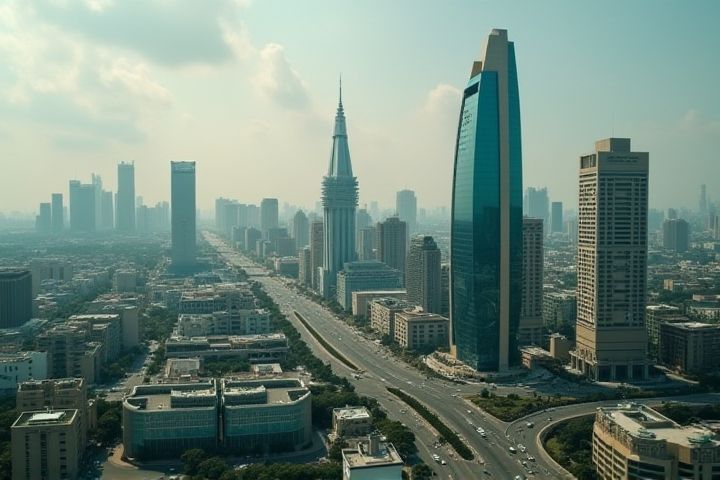
Nigeria is not establishing a new capital; the country's capital remains Abuja, which was officially designated as the capital in 1991. Abuja was chosen due to its centrally located position, promoting better access from diverse regions of Nigeria. The city features modern infrastructure, government buildings, and diplomatic missions, enhancing its role as the political hub. However, discussions about potential development in other cities, such as Lagos, the former capital, often emerge but have not resulted in concrete plans for a new capital. You can stay updated on urban development projects in Nigeria by following the activities of the Federal Capital Territory Administration (FCTA).
Abuja remains the capital of Nigeria
Nigeria is not planning to establish a new capital, as Abuja continues to serve as the central capital city. Designed to foster unity and ease congestion, Abuja was officially designated as the capital in 1991, replacing Lagos due to its strategic location and accessibility. The city is characterized by modern infrastructure, expansive green spaces, and a diverse population reflective of Nigeria's rich culture. Maintaining Abuja as the capital underscores the government's commitment to national cohesion and development.
Plans for new capital not announced
Nigeria has not announced plans for a new capital city, focusing instead on the development of existing urban centers. The current capital, Abuja, was established in 1991 and remains central to political and administrative functions. Infrastructure improvements, economic growth initiatives, and investment in public services are underway to enhance Abuja's appeal and functionality. You may find ongoing debates about regional development strategies that address urbanization challenges without the need for a new capital.
Existing infrastructure frequently upgraded
Nigeria is strategically enhancing its existing infrastructure to support its growing capital needs. This involves significant investments in transportation networks, including roads, railways, and airports, aimed at improving connectivity and facilitating economic activities. Urban development projects are also underway to modernize facilities and services, ensuring they meet the demands of a rapidly urbanizing population. As you observe, these upgrades not only bolster economic growth but also aim to create sustainable living conditions in the capital.
Government focused on economic hubs
Nigeria is actively developing economic hubs to enhance its capital focus on governance and infrastructure. Cities like Lagos and Abuja are being transformed into centers of commerce and technology, fostering innovation and trade. The government's initiatives aim to attract foreign investment, improve public services, and create job opportunities for Nigerians. As these economic hubs evolve, they are expected to play critical roles in driving sustainable economic growth and improving living standards across the country.
Urbanization in Lagos continues
Nigeria is experiencing significant urbanization, particularly in Lagos, which is striving to enhance its status as a contemporary metropolis. The city is undergoing extensive infrastructural development, including transportation systems, housing projects, and commercial facilities, aimed at accommodating its rapidly growing population. As the economic hub of Nigeria, Lagos attracts migrants seeking opportunities, intensifying its demographic expansion. This urbanization effort reflects Nigeria's ambition to diversify its economy and improve living standards for its residents.
Investments in Abuja's development ongoing
Nigeria is continually enhancing Abuja's infrastructure to attract local and foreign investments. Recent initiatives include the development of business hubs, improved transportation networks, and residential complexes aimed at fostering economic growth. The government is prioritizing public-private partnerships to create a conducive environment for investors. Your potential ventures can benefit greatly from these developments, as Abuja positions itself as a strategic investment destination in West Africa.
No relocation plans publicly discussed
Nigeria has not publicly discussed any plans for relocating its capital, which remains in Abuja. The country's leadership emphasizes developing Abuja as a central hub for governance and economic activity. Investments in infrastructure and public services within the capital aim to bolster its capacity to handle increasing populations and administrative functions. You can explore ongoing projects designed to enhance Abuja's status as the nation's political heart.
Regional developments prioritized
Nigeria is increasingly prioritizing regional development through its New Capital Project, aimed at bolstering economic growth and improving infrastructure in underserved areas. This initiative focuses on enhancing transportation networks, establishing educational institutions, and promoting small and medium-sized enterprises to stimulate local economies. By decentralizing economic activities from major cities, the project intends to reduce urban congestion and ensure equitable resource distribution across the nation. Your engagement in these regional developments can contribute positively to creating sustainable communities and fostering inclusive growth.
Sustainability projects in current cites
Nigeria's ongoing urban development initiatives emphasize sustainability, particularly in major cities like Lagos and Abuja. These projects aim to enhance infrastructure through eco-friendly technologies, reduce waste, and improve public transportation systems. The government is prioritizing renewable energy sources, such as solar and wind power, to drive economic growth while minimizing environmental impact. You can expect to see an increased focus on green spaces and efficient waste management as part of these sustainability efforts.
Improvement of transport networks
Nigeria is actively enhancing its focus on improving transport networks, recognizing the critical role efficient transportation plays in economic growth and development. Significant investments are being made into road, rail, and air transport infrastructure to facilitate better connectivity among its major cities and rural areas. Additionally, initiatives aimed at modernizing public transport systems are underway, promoting sustainability and accessibility for all citizens. You can observe these developments reflected in various government projects and partnerships that prioritize infrastructural advancements.
